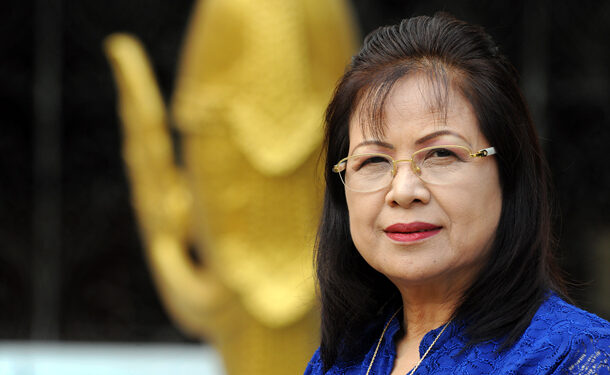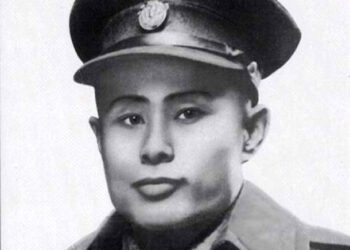After more than two decades in the film industry, former Myanmar actress Daw Swe Zin Htike, also known as Grace, embarked on a new career in the nonprofit sector. She was Population Services International (PSI) Program Director from 1999 to 2013 and now devotes much of her time to educational projects, while continuing to promote Myanmar’s film industry. The 61-year-old award-winning former actress spoke with The Irrawaddy about her wide-ranging work, including in health and education, and her push to encourage more female film directors.
Q: When did your acting career begin?
A: I worked in the film industry from 1971 to 1993. I acted in more than 200 films in that period and won a Myanmar Academy Award in 1977. I was also nominated on four occasions.
Q: What is your educational background?
A: My undergraduate degree was a Bachelor of Commerce. I have also studied accountancy, French and the Abhidhamma and received a media fellowship in the United States in 2002.
Q: What did you do after moving on from the film industry?
A: From 1993, I worked for the United Nations Children’s Fund (UNICEF) in Myanmar as a consultant producing advocacy materials. I then moved to Population Services International (PSI) in 1999 and worked there until June 2013. After retiring, I focused on my own company, Communication Services Group (CSG), which I helped found in 2000. At CSG, we provide three kinds of services. Translation services for TV content; education services including a mobile education project [providing non-formal education via mobile classrooms to children compelled to work in teashops to support their families]; and production services [for short films and documentaries].
[In the past], the government refused to acknowledge that there were HIV/AIDS patients in Myanmar. But people were dying of AIDS. I saw it. I was especially close with many gay people in the film industry. Many of them died without knowing what they were suffering from. I felt that I needed to educate them on what was happening and how to help prevent it. I understood that I couldn’t work alone on this issue. I needed to work under an umbrella. That’s why I decided to work for PSI which had resources and funding. I started as a project coordinator earning US$450 per month. I could earn more than this in the film industry, so I wasn’t working at PSI for the money. I could learn a great deal working there.
I was criticized by one former senior government official who asked: why are you involved in this issue [raising awareness of HIV/AIDS], you are not a doctor, just an actress. But I did my best. In 2000, [annual] condom sales were just 20,000 for the entire country. By 2004, sales reached one million nationwide. I was happy with this change.
Beyond 2011, I realized that health is not the only essential issue in Myanmar. That’s why I wanted to do more in the education sector and worked for initiatives like the Myanmar Mobile Education Project (myME).
Q: What challenges did you face in transitioning from a successful acting career to the NGO field?
A: Even when I was working in the film industry, I wanted to gain new experiences. That’s why I studied at the same time as I was working. I became involved in making short educational films and pamphlets for health education programs with UNICEF. During these years [working in the NGO field], I was satisfied with some programs but not with others. Working with limited human resources was sometimes difficult. I met many kinds of people, including some with different mindsets to mine. But doing something is better than nothing.
In 2002, I went to the United States and met with Myanmar communities there. I asked if they would come back to Myanmar to work for NGOs and help people. Some did come back later.
Q: What is your ongoing involvement with the film industry?
A: In 2012, I decided to help promote and develop the Myanmar movie industry by organizing the international relations department in the Myanmar Motion Picture Organization (MMPO). I then became secretary of the MMPO’s international relations committee. After assuming this position, some outsiders didn’t think I would be up to the task. We were not on the same page and they just worked for their own interests. I work for the people’s interests.
When I was young, I wondered why the movie industry was so commercialized and why people couldn’t work for each other. But later I realized that the film industry is totally dependent on the market and investment. In recent times, mainstream Myanmar movies haven’t been able to impact the international market. So how can we encourage independent film makers?
MMPO has no budget for the international relations committee. So I provide the budget myself in order for some movies to be shown in international film festivals. I define my achievements by what I have done to support the film industry in this country. I would like to encourage women to become creative directors and to try their best.
Q: Why do you think there are now just a few female film makers?
A: There were some female film makers in the past. In 1940, there was Daw Khin Nyunt, then Parrot Daw Mya Mya, and following them, Daw Thin Thin Yu and Daw Wah Wah Win Shwe. The number of female film directors is small due to a lack of trust. Even in today’s environment, female directors are not trusted with the responsibility. Some [in the industry] don’t want women to become decision makers. The majority of people working in film distribution are also men, so how can we compete with other male film makers and get our films distributed? I think some men unconsciously discriminate against their female competitors. But Myanmar women have good stamina and we prove that by working hard.
Q: How is the MMPO working to support the emergence of more female film directors in the future?
A: I am encouraging women to attend script writing and directing classes which recently opened at the MMPO. I’m urging them to study seriously to become successful directors. Most actresses are just recognized as sex symbols—and the younger, the better. But if the role of women behind the camera is also recognized and promoted, we can improve [perceptions and attitudes]. We also need mutual understanding. We need to demonstrate our abilities even as people are trying to test us.
Q: Do you think the majority of actresses are discriminated against in terms of their earnings? For example, actors often receive more than actresses even when the latter are in leading roles?
A: In the 1950s, some actresses actually earned more than their male counterparts, for example, Daw Kyi Kyi Htay, Daw Wah Wah Win Shwe and Daw Moh Moh Myint Aung.
There are two things to mention. Actresses should be paid according to their abilities. They shouldn’t be satisfied with smaller wages. If women were able to produce films with their own money, there would be more female lead actors.

















